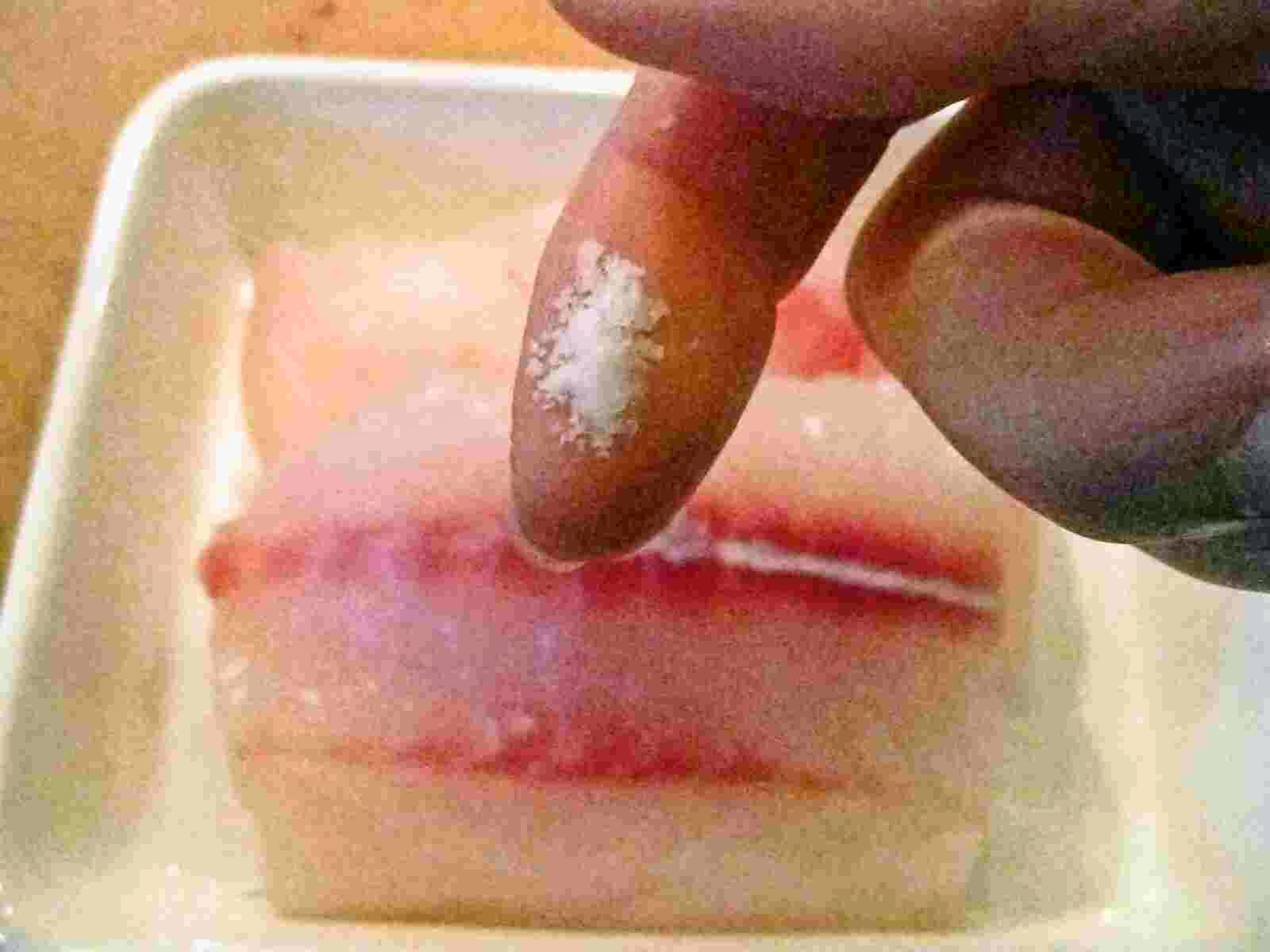Enoki's fruity sourness goes well with mustard and white wine. The sauce is creamy, thanks to enoki, and has a clear soy sauce flavor, which also is a great match with mustard. For mustard lovers, this is a wonderful take on mushroom sauce.
1/2 of recipe:
154 calories; 18.6 g protein; 5.0 g fat; 6.7 g carbohydrate; 4.9 g net carbs; 275 mg sodium (with 50% reduced-sodium soy sauce; 389 mg with regular soy sauce); 59 mg cholesterol; 1.8 g fiber
<Ingredients>
1-2 fillets fish (188 g tara cod in photo)
Pinch salt & pepper (to sprinkle on fish; not in photo)
Flour (to coat fish; not in photo)
1/2 tbsp oil (to saute fish; not in photo)
For mustard enoki sauce
70-100 g enoki mushroom (100 g in photo)
1 small clove ginger
1 tsp butter
2 tbsp white wine
1 tsp rice vinegar
1/2 tbsp soy sauce
1 tsp karashi Japanese mustard powder
<Directions>
1.
Sprinkle salt and pepper, and let sit 10 minutes.
2.
Julienne ginger.
Remove root ends of enoki, and cut in half. Pick apart lower half into smaller bundles.
Mix karashi with the same amount of water.
3.
Wipe off moisture on fish surface.
Coat with flour, and pat off excess.
Saute on medium high.
(With the fish on right side in photo, the thinner part of the fillet was folded to make the piece thicker.)
When 1/2 to 2/3 from the bottom is done (turns opaque), flip, and cook the other side.
When done, transfer to plates.
4.
Wipe away oil in frying pan, then melt butter.
Add ginger, and saute until fragrant.
Add enoki, and stir.
5.
When enoki softens, add white wine, rice vinegar, karashi + water mixture, mix well, and bring to boil.
Add soy sauce, and mix well.
Pour over fish, and serve hot.
<Notes>
1/2 of recipe:
154 calories; 18.6 g protein; 5.0 g fat; 6.7 g carbohydrate; 4.9 g net carbs; 275 mg sodium (with 50% reduced-sodium soy sauce; 389 mg with regular soy sauce); 59 mg cholesterol; 1.8 g fiber
<Ingredients>
Pinch salt & pepper (to sprinkle on fish; not in photo)
Flour (to coat fish; not in photo)
1/2 tbsp oil (to saute fish; not in photo)
For mustard enoki sauce
70-100 g enoki mushroom (100 g in photo)
1 small clove ginger
1 tsp butter
2 tbsp white wine
1 tsp rice vinegar
1/2 tbsp soy sauce
1 tsp karashi Japanese mustard powder
<Directions>
1.
Sprinkle salt and pepper, and let sit 10 minutes.
2.
Julienne ginger.
Remove root ends of enoki, and cut in half. Pick apart lower half into smaller bundles.
Mix karashi with the same amount of water.
3.
Wipe off moisture on fish surface.
Coat with flour, and pat off excess.
Saute on medium high.
(With the fish on right side in photo, the thinner part of the fillet was folded to make the piece thicker.)
When 1/2 to 2/3 from the bottom is done (turns opaque), flip, and cook the other side.
When done, transfer to plates.
4.
Wipe away oil in frying pan, then melt butter.
Add ginger, and saute until fragrant.
Add enoki, and stir.
5.
When enoki softens, add white wine, rice vinegar, karashi + water mixture, mix well, and bring to boil.
Add soy sauce, and mix well.
Pour over fish, and serve hot.
<Notes>
- Fish can be grilled or steamed.
- This sauce tastes quite strong, and the above amount should be enough for larger pieces of fish (300 g or more in total).
- Above, two asparagus spears were microwaved while cooking fish and served together. It’s always nice to have something green on your plate.
- Western mustard paste works fine, too. If using Western mustard, cut back on vinegar according to the sourness of the mustard. Also watch the sodium content of mustard from jars or karashi paste in tubes, if you are on low-sodium diet (karashi powder is free of sodium).
- The above nutrition figures are based on sprinkling 0.3 g salt on fish and 75% of salt being absorbed by fish. Basically, 0.3 g salt translates into a very generous pinch in my case (my pinch of salt is 0.1 g; a pinch of salt in most Japanese cookbooks is 0.2 g when nutrition is calculated).




















No comments:
Post a Comment